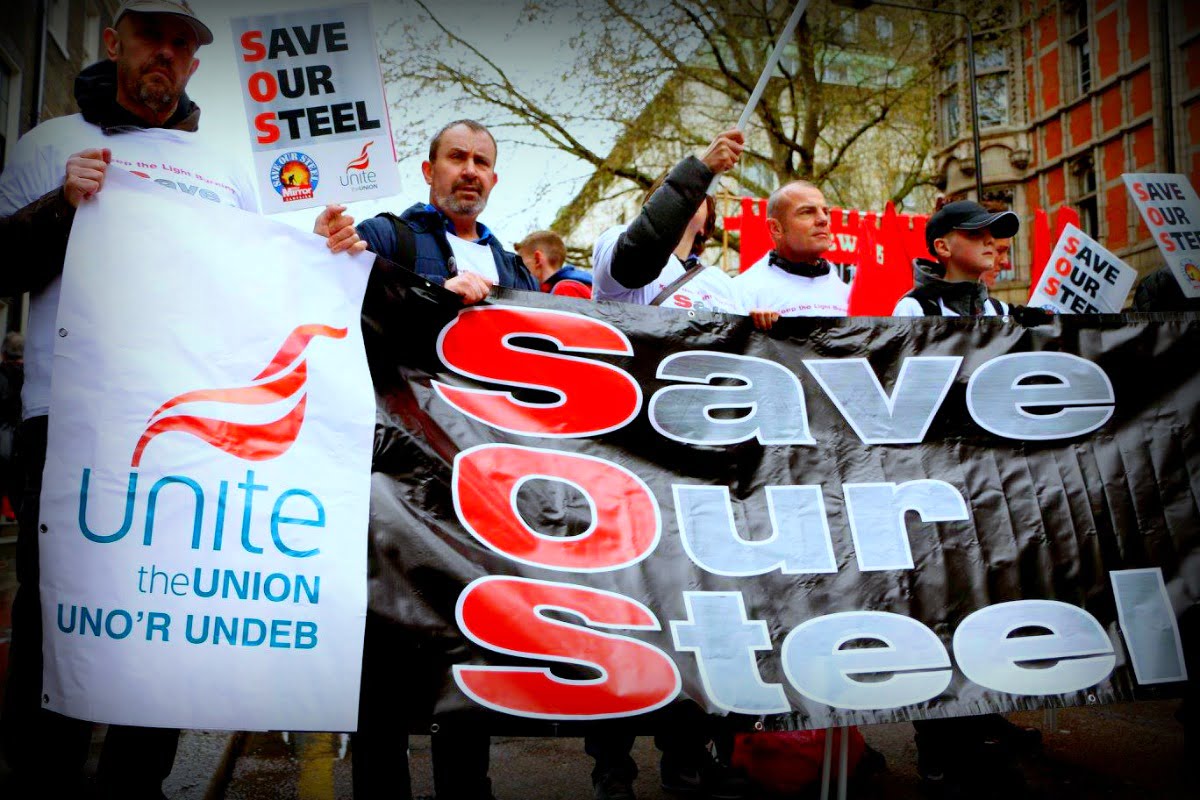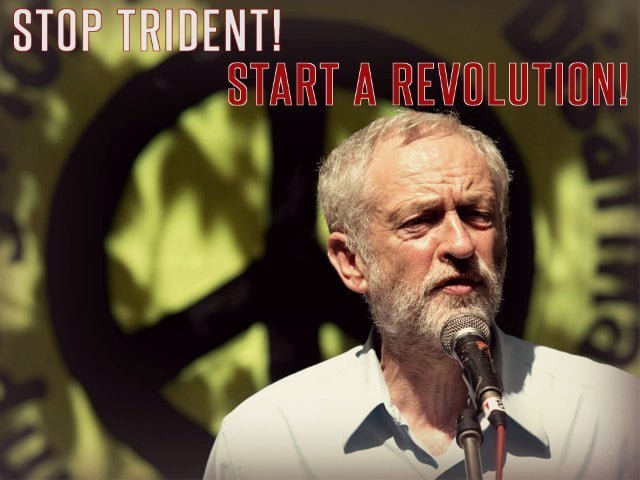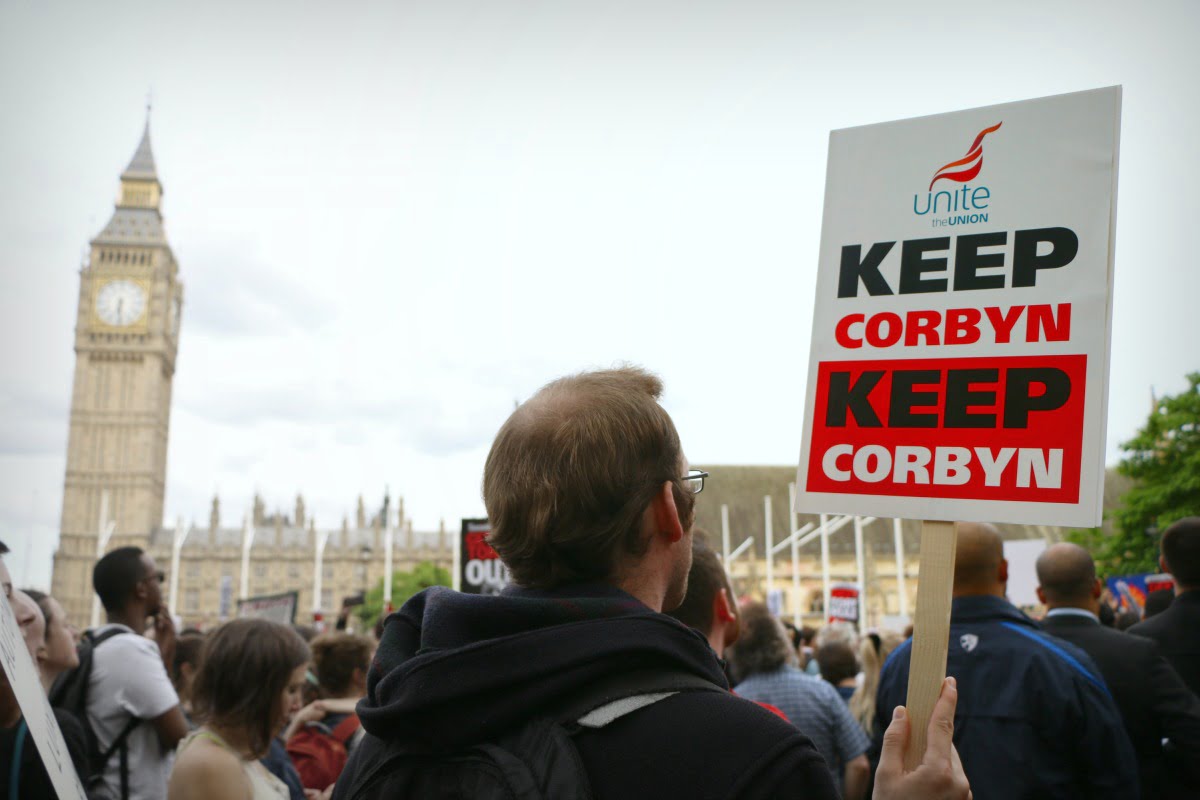This week, delegates from Unite the Union are assembling in Brighton for the union’s policy conference. Top of the agenda for Unite and all trade unionists must be the question of defending Jeremy Corbyn against the Blairite coup attempts. We publish here a summary by Unite members of the key issues up for debate at this year’s conference.
This week, delegates from Unite the Union are assembling in Brighton for the union’s policy conference. Top of the agenda for Unite and all trade unionists must be the question of defending Jeremy Corbyn against the Blairite coup attempts. We publish here a summary by Unite members of the key issues up for debate at this year’s conference.
TONIGHT: Socialist Appeal Fringe Meeting @ Unite the Union Policy Conference
DEFEND CORBYN! FIGHT FOR SOCIALISM! DEFEAT THE BLAIRITE COUP!
Tuesday 12th July, 7pm
The Globe Pub, 78 Middle Street, Brighton BN1 1AL
Click here for live updates by young observers at the Unite the Union policy conference. Reports so far can also be read below.
Since Corbyn’s election last summer, an unbridgeable chasm has opened up in the party. On the one hand we have the presence of a continuing majority in the Parliamentary Labour Party (PLP) who do not support Corbyn and are only interested in their own careers. Like scum on a stagnant pond, these creatures rose to the surface in the past period of Blairism and New Labour. The election of Corbyn last year, however, brought hundreds of thousands of workers and young people into the party looking for a political alternative to provide a radical break from the failed status quo.
This chasm is now heading towards an open split as out-of-touch MPs wage civil war against the democratically elected Labour leader and the Party’s grassroots that overwhelming supports him. The ruling class and the careerists in the PLP cannot stomach the prospect of a Corbyn-led Labour government. They will avoid this at any cost and are prepared to split the party in order to do so.
Up to this point Corbyn, Momentum and the big unions, including Unite, have refrained from fighting back against the Blairites. The latest coup attempts render this position untenable. Len McCluskey and the other major union leaders have publically given their full support to Corbyn. McCluskey has even hinted at the possibility of Unite calling for deselection of those Labour MPs that are seeking to oust Corbyn. The question of mandatory reselection must now be raised by Unite members throughout the Labour movement.
The trade union leaders should make an open call to mobilise their members in defence of Corbyn, calling for the deselection of any MP who refuses to recognise Jeremy’s enormous democratic mandate. Unite funding should be withdrawn from any Labour candidate who does not back Corbyn, and the unions should organise to put forward Labour candidates who do represent the interests of trade unionists and the wider working class.
Above all, McCluskey and the union leaders must throw their full resources behind Corbyn in any leadership election, and assert that they will not accept any attempts by the Blairites to try and keep Corbyn off the ballot. If these right-wing MPs are unwilling to unite behind Corbyn to defeat the Tories, then they should leave the party and go to join the Tories.
See below for Len McCluskey’s speech to conference yesterday about the Blairite coup:
Len McCluskey at @unitetheunion conference #UPC2016 “This was an attempted political lynching a wrecking operation” pic.twitter.com/BKS2deQ1BE
— Jorge Martin (@marxistJorge) July 11, 2016
Protectionism or socialism?
 Elsewhere on the agenda of this year’s conference, there are no fewer than six motions demanding that the union lobby for protectionist measures of one type or another. As Britain’s trade agreements with Europe unravel and protectionist tendencies accelerate on a world scale, these questions are going to acquire a burning importance.
Elsewhere on the agenda of this year’s conference, there are no fewer than six motions demanding that the union lobby for protectionist measures of one type or another. As Britain’s trade agreements with Europe unravel and protectionist tendencies accelerate on a world scale, these questions are going to acquire a burning importance.
Naturally enough, it has been from those sectors devastated by cheap imports, particularly in the acutely hit steel industry, that the key motions have originated: the Metalworkers’ NISC and the Port Talbot branch in particular. Various motions call for the union to lobby the government, or indeed the EU, to “buy British”; to refusing China privileged “Market Economic Status” and subsequent access for its cheap commodities to EU markets; and to reduce taxes on struggling British industries in an effort to encourage investment. One motion in particular calls on the government to support UK steel in a similar manner to that which the Italians have done. But why are these questions becoming so acute now? And does protectionism really offer an alternative to free trade?
The case of Italy is instructive in a number of respects. Over a year ago the Italian government took over parts of Italy’s biggest steel plant, and on the pretext of environmental concerns handed over €2 billion to the owners, ILVA. In December the government began moves to tear up workers’ contracts and to drive down wages. The purpose was clear: having stepped in with vast sums of public money (public money which will come out of the pockets of ordinary taxpayers, i.e. workers), the government was now seeking to make the steelworkers themselves pay through cuts to wages and conditions in order to restore profitability and return the steel plant to the private sector. The workers however reacted with tremendous militancy, taking strike action and occupying the plant in January.
The first lesson from this is that the crisis affecting British steel is part of a European and worldwide crisis. Fundamentally this is a crisis of global capitalism. As the huge accumulation of capacity makes itself felt in a crisis of overproduction, markets have become glutted and competition between national capitalist classes has increased. The rise in protectionist measures and state intervention merely reflects this fact. Such measures drawn to their logical conclusions will cause national capitalists to retreat into their home markets, further exacerbating the crisis of overproduction that stalks the system.
The Italian situation also demonstrates how the capitalist state won’t intervene to “save” this or that industry in the interests of the workers, but only to support a decrepit capitalist class. The current rescue of Italian steel is taking place at the expense of Italian workers’ wages, jobs and conditions.
The super-abundance in society ought to be a cause for tremendous celebration rather than misery. We have the means to reduce the working day and automate the dirtiest and most dangerous jobs, whilst maintaining and far improving standards of living. This potential however can only be achieved by putting an end to the anarchy of the market and fighting for the socialist transformation of society.
In the end “free trade” versus “protectionism” represents a false dichotomy for workers. In opposition to national protection we propose the slogan of international socialism! In opposition to state “bailouts” of industry, we put forward the slogan of nationalisation under workers’ control without compensation!
Trident
 Trident is also high up the agenda of the union’s conference this year. Whilst the question has been discussed in previous years, divisions within the Labour Party over this question give the debate a changed character.
Trident is also high up the agenda of the union’s conference this year. Whilst the question has been discussed in previous years, divisions within the Labour Party over this question give the debate a changed character.
In fact, Britain’s nuclear arsenal is completely ineffectual: as a nuclear power Britain becomes less rather than more secure, as other nations are encouraged to acquire such weapons. Furthermore Britain’s nuclear arsenal is effectively controlled by the United States, whose own nuclear arsenal completely dwarfs our own.
For the ruling class, this is wholly beside the point. Trident renewal guarantees some very profitable contracts whilst giving the British ruling class the illusion of political importance on the world stage. The presence of a lifelong campaigner for nuclear disarmament at the head of the Labour Party then is an intolerable threat to their interests. The Blairite wing of the party has acted as the direct mouthpiece of the ruling class in the party throughout this dispute. When Corbyn announced last summer then that he would not launch nuclear weapons he was met by an insane chorus of his own MPs who announced that they would indeed be prepared to use such weapons! Clearly the union has a duty to come to the defence of Corbyn on this issue.
Traditionally the union’s own position has split along the lines of either safeguarding jobs by renewing Trident, or opposing renewal as a threat to humanity and a grotesque waste of money. The current policy of the union represents a compromise that effectively equates to supporting Trident’s renewal until such time as a viable alternative is proposed.
The lines of division within the union on this question are really a false dichotomy that arises when we consider the question in the narrow confines of a capitalist economy. We would argue that there is no viable alternative under capitalism. Under capitalism failing to renew Trident will of course mean job losses in the aerospace and weapons industry. Indeed, the move away from weapons manufacture in general would represent a blow to workers in these industries. Capitalism is an anarchic system and cannot be planned when shifts in production take place.
Whilst the £100 billion earmarked for Trident could be spent elsewhere, that is cold comfort for workers directly affected in the nuclear weapons industry. Corbyn has suggested that an alternative might be to build nuclear submarines without any nuclear warheads. In fact, such an absurd scenario, where we generate thousands of tonnes of floating scrap metal, is the closest thing to a “solution” that preserves jobs under this absurd system.
We must be at the forefront in pushing forward a genuine alternative: we must demand that the major nuclear and aerospace monopolies, along with energy, transportation and other key sectors are nationalised under democratic workers’ control as part of a socialist plan of production. On such a basis it would be possible to retool factories in a planned manner towards the production of things which are actually socially useful and that we really need.
Live updates from Marxist students @ Unite Policy Conference
Click here for live updates, or read below for reports from the first day of conference.
Monday 11 July, 5:30pm
This afternoon’s discussion was dominated by Unite’s policy on Trident. This is especially important given the vote coming up next week in Parliament on whether to approve the building of new Trident submarines.
The debate was unhelpfully set up as a choice between utopian political principles and a practical defence of jobs, with many delegates suggesting that the vote was a choice between these two mutually exclusive things. In reality this is a false dichotomy. The replacement of Trident does not guarantee jobs, as many delegates pointed out, huge numbers of defence jobs are being lost already. The fact is that our jobs are at the mercy of the capitalist bosses and a vote to renew Trident doesn’t change that.
Those opposed to renewing Trident argued that Unite should promote defence diversification instead. It was argued in return that this was unrealistic, despite Corbyn’s strong support for such a policy. It’s true that such a policy would be unrealistic under capitalism because the aerospace and defence bosses would never agree to reinvesting their assets in potentially less profitable enterprises. This is why the question of nationalisation, without compensation, of these industries so that their human and material resources and be planned in a socially useful way is absolutely key to this debate. Unfortunately this method of diversification on our terms and with socialist policies, through a democratically planned economy, was not brought out during the discussion.
In the end a statement by the Executive Council that tries to balance between both positions was supported by the conference. The essence of that motion is that Unite supports the renewal of Trident until there is a realistic likelihood of defence diversification taking place. This will be quite disappointing for many people, including members of Unite and especially young members. We want to see a union that is forward-looking, with a clear vision of what the economy should look like in the future and how to fight for it. This was an opportunity to outline what kind of industry we would like to replace Trident with, and crucially how we would achieve it – by nationalisation and planning of the economy by workers themselves. Unfortunately this opportunity has been missed and we are left with what looks like a passive acceptance by the union of the status quo of mass production of weapons of mass destruction.
However, almost all the young members of Unite who spoke in the debate did so passionately against the Executive statement. Clearly this is not an issue that will be going away any time soon and young people are ready to fight for a world free from the madness of nuclear weapons.
——————————–
Monday 11 July, 1pm
This morning saw speeches from Tony Woodhouse and Len McCluskey, chair and general sectretary of Unite respectively. Both spoke about the union’s achievements and, crucially, indicated their support for Jeremy Corbyn. Len described the actions of the PLP as a “squalid Westminster bubble coup” and said that “the instigators will forever be branded with the mark of infamy”.
The conference passed a motion calling for a public inquiry into the financial crisis and, significantly, for a publicly owned and democratically accountable banking sector. The delegate moving the motion talked about the need for nationalisation of the banks. Those speaking in favour of the motion attacked the banks and bankers most closely connected to the crash in 2008. What could have added to the debate was some discussion of the contradictions and crisis inherent in capitalism, meaning that this is not a crisis caused by greedy individuals, but one that is inevitable under the capitalist system.
Motions on manufacturing and especially steel were discussed. These advocated protectionist measures in one form or another to defend British industry. The crisis affecting British steel is part of a European and worldwide crisis – a crisis of global capitalism. As the huge accumulation of capacity makes itself felt in a crisis of overproduction, markets have become glutted and competition between national capitalist classes has increased. The rise in protectionist measures and state interventions merely reflects that fact.
But in the end free trade vs protectionism represents a false dichotomy for workers. In opposition to national protection we should raise the slogan of ‘international socialism’. And in opposition to state ‘bailouts’ of industry we should put forward nationalisation without compensation under workers control and management.
Finally this morning, it was good to see enthusiastic support for the renationalisation of rail and bus services. It would, in our opinion, be possible to go even further than the motion that was passed, which called for the gradual renationalisation of the railways as the franchises run out. We should be calling for the immediate renationalisation of the railways, with no compensation given to those who have used public transport to get rich by exploiting staff and passengers.
————————
Sunday 10 July, 1pm
This morning’s regional delegation meetings covered some of the preliminary conference business.
In the South East delegation meeting the regional secretary, Jennie Formby, who also sits on the Labour party’s national executive committee, explained the latest developments in the Labour party regarding Corbyn’s leadership. She condemned the actions of the 172 MPs who have taken it upon themselves to undermine the democratically elected leader of the Party and set themselves up against their own members.
It’s clear that this will be a big issue at this conference and we can expect several emergency motions and an executive statement on the question.
Len McCluskey, the general secretary of Unite, made this statement yesterday:
I am dismayed at the statement issued by Tom Watson announcing his withdrawal from talks aimed at resolving the crisis in the Labour party
Extraordinarily, I received no notice of this statement before it was issued. I had made arrangements for a meeting of trade union leaders, Tom Watson and representatives of the PLP and the party leader for tomorrow, arrangements requested by Tom Watson and his colleagues, specifically for Mr Watson’s convenience.
In that context, when the possibility of a workable plan had never seemed closer, Tom Watson’s actions today can only look like an act of sabotage fraught with peril for the future of the Labour party.
I must clarify one point in Tom Watson’s statement; I made it absolutely clear from the outset of these discussions that Jeremy Corbyn’s resignation as the leader was not on the agenda. Watson knew that, and it is entirely wrong to suggest that any public statement by Jeremy represented any change in the situation. This is a deeply disingenuous manoeuvre.
I will continue to work with trade union colleagues and others to chart a way forward, including meeting the legitimate concerns of Labour MPs.
Should there have to be a leadership election, I must warn that any attempts to keep Jeremy Corbyn, elected just 10 months ago with an enormous mandate, off the ballot paper by legal means risks a lasting division in the party,
It is time for everyone to commit to a democratic and dignified procedure as the only way to avert such a disaster for working people.






